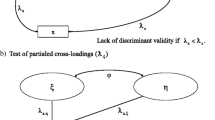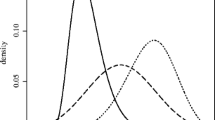Abstract
Given the preference ordering of each of a number of individuals over a set of stimuli, it is proposed that if the preference orderings are generated in a Euclidean space ofr dimensions which can be recovered by unfolding the preference orderings, then a factor analysis of the correlations between individual's preference orderings will yield a space ofr + 1 dimensions with the originalr-space embedded in it, and the additional dimension will be one of social utility. The proposition is clearly shown to be satisfied by means of the Monte Carlo technique for both random and lattice stimuli in three dimensions and for two other examples with random stimuli in one and two dimensions.
Similar content being viewed by others
References
Anderson, T. W.An introduction to multivariate statistical analysis. New York: Wiley, 1958. Ch. V.
Bartlett, M. S. Tests of significance in factor analysis.Brit. J. Psychol., Statist. Sec., 1950,3, 77–85.
Bartlett, M. S. The effect of standardization on aχ 2-approximation in factor analysis.Biometrika, 1951,38, 337–344.
Bartlett, M. S. A further note on tests of significance in factor analysis.Brit. J. Psychol., Statist. Sec., 1951,4, 1–2.
Bartlett, M. S. Factor analysis in psychology as a statistician sees it.Uppsala symposium on psychological factor analysis. Uppsala, Sweden: Almqvist and Wiksell, 1953. Pp. 23–34.
Bennett, J. F. and Hays, W. L. Multidimensional unfolding: determining the dimensionality of ranked preference data.Psychometrika, 1960,25, 27–44.
Coombs, C. H. Psychological scaling without a unit of measurement.Psychol. Rev., 1950,57, 145–158.
Coombs, C. H.A theory of psychological scaling. Engin. Res. Inst. Bull., No. 34. Ann Arbor: Univ. Michigan Press, 1952.
Coombs, C. H. Social choice and strength of preferences. In R. M. Thrall, C. H. Coombs, and R. L. Davis (Eds.),Decision processes. New York: Wiley, 1954. Pp. 69–86.
Coombs, C. H. Inconsistency of preferences in psychological measurement.J. exp. Psychol., 1958,55, 1–7.
Hays, W. L. and Bennett, J. F. Multidimensional unfolding: determining configuration from complete rank order preference data.Psychometrika. (in press)
Kendall, M. G. and Smith, B. B. Factor analysis.J. roy statist. Soc. (B), 1950,12, 60–94.
MacRae, D., Jr. A factorial analysis of political preferences.Revue Francaise de Science Politique, 1958,8, 95–109.
RAND Corporation.A million random digits with 100,000 normal deviates. Glencoe, Illinois: Free Press, 1955.
Tucker, L. R.A method for synthesis of factor analysis studies. Princeton: Educ. Test. Serv. Res. Bull. No. 984, 1951.
Author information
Authors and Affiliations
Additional information
The preparation of this paper was supported in part by a grant from the National Science Foundation and in part by Project MICHIGAN, a project of the University of Michigan in the field of Combat Surveillance sponsored by the Department of the Army. The contract (DA-36-039 ac 78801) is administered by the U. S. Army Signal Corps. The authors are indebted to L. A. Raphael, Caroline K. Tefft, and F. M. Goode for programming assistance, and to L. W. Staugas for providing other computer services during various stages of this study.
Rights and permissions
About this article
Cite this article
Coombs, C.H., Kao, R.C. On a connection between factor analysis and multidimensional unfolding. Psychometrika 25, 219–231 (1960). https://doi.org/10.1007/BF02289726
Received:
Revised:
Issue Date:
DOI: https://doi.org/10.1007/BF02289726




